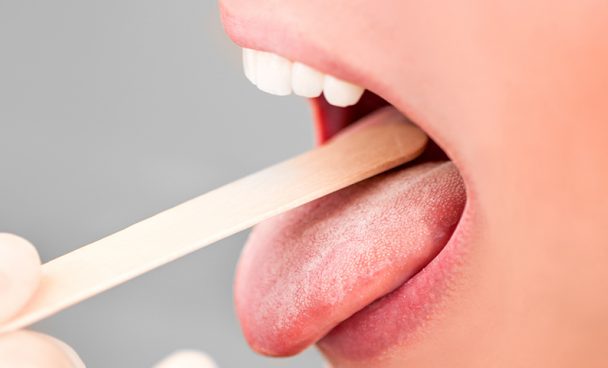What is mouth cancer
Mouth cancer is a malignant tumor that affects the lips and structures of the mouth, such as the gums, cheeks, roof of the mouth, tongue, and the area under the tongue. The INCA (National Cancer Institute) estimates that for each year of the 2020/2022 triennium, 15,190 new cases of mouth and oropharyngeal cancer will be diagnosed in Brazil (11,180 in men and 4,010 in women).
The main histological type of mouth cancer is squamous cell carcinoma (90% of cases). It begins in the cells that line the mouth, and can be classified as either “in situ” (present only on the surface) or invasive, when it has already reached deeper layers.
The risk factors associated with oral cavity cancer are:
- Smoking – increases the risk of developing mouth cancer by 10 times;
- Excessive alcohol consumption – evidence shows that acetaldehyde, the main and most toxic metabolite of alcohol, disrupts DNA synthesis and repair, and therefore may promote carcinogenesis. People who consume alcohol in high quantities may also have diets lacking in essential nutrients, such as folate, making target tissues more susceptible to the carcinogenic effects of alcohol; and
- Poor oral hygiene – makes the oral cavity more susceptible to the carcinogenic effects of the above factors.
Symptoms of mouth cancer
It’s important to mention that many of the symptoms or signs of mouth cancer are also associated with benign issues. Therefore, it’s important to consult a doctor or even a dentist to evaluate the area at any sign.
The signs and symptoms of mouth cancer may include:
- A mouth sore that doesn’t heal;
- Persistent mouth pain;
- A lump or thickening in the cheek;
- A white or red patch on the gums, tongue, tonsil, or lining of the mouth;
- A sore throat or feeling that something is caught in the throat;
- Difficulty chewing or swallowing;
- Difficulty moving the jaw or tongue;
- Numbness in the tongue or other areas of the mouth; and
- A lump or mass in the neck.
Diagnosis of mouth cancer
The diagnosis of oral cavity cancer can be made with a clinical examination, but confirmation depends on a biopsy, which is often done with local anesthesia in the office. The collected material is sent for histopathological analysis.
Once the disease is confirmed, other tests are performed to determine the extent (stage) and the best treatment. These may include:
- Computed tomography (CT) or magnetic resonance imaging (MRI): provides important information regarding the extent of affected structures and aids in the differential diagnosis with benign lesions;
- PET/CT: performed in some cases to evaluate if there are disease-related lesions in other organs (metastases);
- Blood tests: blood tests cannot diagnose mouth tumors. However, they are requested to assess the patient’s overall health, especially before treatment; and
- Dental examination: before radiotherapy treatment, the doctor may request a preventive dental examination from the patient and, if necessary, perform tooth extraction before starting treatment. In the case of the removal of part of the jaw or palate, the orthodontist will work to ensure that the artificial teeth and the remaining natural teeth fit properly.
Treatments for mouth cancer
The treatment of mouth cancer is mostly surgical, both in smaller lesions with less functional impact and in larger tumors. Radiation therapy and chemotherapy may be indicated to complement surgical treatment or when surgery is not possible (irreversible disease).
Surgery for mouth cancer usually involves removing the tumor and also removing the lymph nodes in the neck. In major surgeries, the resection of bone segments may be necessary. Other procedures may also be performed later to restore the function of the resected area.
Recent years have seen advancements in mouth cancer treatment, which now include:
- Intensity-modulated radiation therapy (IMRT): a type of radiation therapy that is more precise in targeting the tumor. This results in fewer side effects for the patient and more significant outcomes;
- Targeted therapy: drugs that work differently from standard chemotherapy. They tend to have different (and less severe) side effects and act by preventing the tumor cell from multiplying, slowing down or even stopping the growth of cancer cells. This therapy can be combined with radiation therapy for some types of early-stage cancer or with chemotherapy in advanced cases; and
- Immunotherapy: this treatment type boosts the activity of the patient’s immune cells to fight the disease. It can be used alone or in combination with chemotherapy, depending on the patient’s clinical characteristics and the expression of PD-L1, a protein present on the tumor’s surface.
Prevention of mouth cancer
The best way to prevent mouth cancer is to avoid its main risk factors – therefore, it is recommended not to smoke, not to consume alcohol excessively, and to maintain good oral hygiene.
